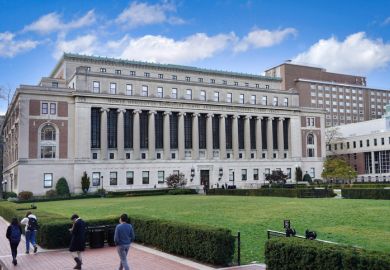The European Union’s plan to take the next leap forward in higher education integration could leave UK universities looking dangerously isolated after Brexit, experts have warned.
Inspired by a recent speech given by Emmanuel Macron at Sorbonne University, in which the French president called for greater higher education links across the Continent, the European Commission now proposes to turbocharge academic mobility via the creation of a “European Education Area” by 2025.
Among the policies unveiled at a meeting of EU leaders in Gothenburg were: the mutual recognition of higher education and school-leaver diplomas, under what would be known as the “Sorbonne Process”; the Europe-wide roll-out of a new EU eCard containing student records and academic achievements, thereby aiding cross-border university applications; and the doubling of the number of young people participating in the Erasmus+ exchange programme at a cost of €29.4 billion (£26.1 billion) between 2021 and 2027.
Plans for a Sorbonne Process, which would require legislation in different EU countries, are a major departure from the Bologna Process agreed in 1999, which depends on institutional and governmental cooperation rather than legal statutes for the standardisation of higher education qualifications.
Anne Corbett, senior associate at the London School of Economics and an expert on the Bologna Process, said that the “big idea” of an common education area would need “big political back-up” to make it a reality, having been first proposed around 1992 when the Maastricht Treaty was signed.
Dr Corbett believed, however, that “it is possible that this time its luck is in” thanks to the “strong political drive [of] Emmanuel Macron with all the heft of the French presidency, his own ideas for a network of European universities and France’s advance planning to be in charge of the Bologna Process for its 20th anniversary”.
“My money is on at least some tangible outcomes,” Dr Corbett said.
Securing the intergovernmental legal basis for a European Education Area would be difficult, but is likely to have consequences for UK universities if they find themselves outside it, said Kurt Deketelaere, secretary general of the League of European Research Universities.
“The EU has very little power in the world of higher education and all the big results of Bologna, such as harmonisation, have come without legislative back-up,” said Professor Deketelaere.
“But if they pulled legislation off – and allow me some doubts – both the EU and the UK would need to think about recognition and equivalence of qualifications from both sides,” he said. Consideration would need to be given about whether, for instance, EU states would recognise qualifications in medicine or law issued in the UK under a new framework, he added.
However, he questioned the stated desire for several new European-funded institutions or the creation of new networks of European universities – as espoused by Mr Macron in his Sorbonne speech, and subsequently endorsed by the European Commission.
“I have a problem with someone saying it cannot be done without new institutions or networks – given all the staffing costs, is this really necessary?” asked Professor Deketelaere, who claimed that any new institutions relating to teaching or governance would largely replicate the work done by universities or his own network of universities.
Rajani Naidoo, director of the University of Bath’s International Centre for Higher Education Management, said that it would be a “tragedy for the UK” to be excluded from the proposed scheme and that it should seek full, or at least associate, status as it exits the EU in April 2019.
“It is very clear that the UK has both contributed and benefited from an open European area for education – the proposed Sorbonne Process would take this on to the next level,” said Professor Naidoo.
“Individual vice-chancellors as well as mission groups and Universities UK need to take a more proactive role to ensure that we are able to participate.”
Paul James Cardwell, professor of law at the University of Strathclyde, who researches EU law, said that the proposed Sorbonne Process and wider reforms “speak to an agenda of improving life and the study environment for Europe’s students” by easing mobility across Europe.
“Brexit has highlighted that increased skills will be needed for UK graduates, particularly in languages, and this programme would certainly suit that agenda,” said Professor Cardwell.
“Being outside this system will mean that the UK can, at best, hope for some kind of an associated role in line with the non-EU countries that currently participate in Erasmus,” he said, adding that “the opportunity for the UK to take the lead in forging a genuine European higher education area has been lost”.
Register to continue
Why register?
- Registration is free and only takes a moment
- Once registered, you can read 3 articles a month
- Sign up for our newsletter
Subscribe
Or subscribe for unlimited access to:
- Unlimited access to news, views, insights & reviews
- Digital editions
- Digital access to THE’s university and college rankings analysis
Already registered or a current subscriber? Login








